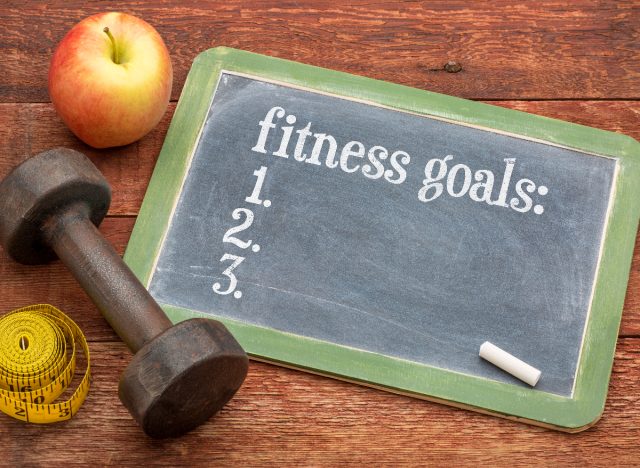9 Sneaky Signs You're Overtraining

Although devotion to exercise is key to a healthier, happier life, if you're overtraining, you risk undoing your progress completely. "There's a common misconception that going to the gym every day means that you're super-fit and healthy, but actually you could be doing more harm than good," says Rosalind Pressman, co-founder of Ketanga Fitness Retreats and a certified group exercise instructor in New York.
Because the difference between pushing yourself and edging toward a cliff can be hard to spot until it's too late, here are some of the sneaky signs you're overtraining.
You're overly emotional

When PMS-level emotions strike all month long, it's a signal that you should take your workouts down a notch. "When a client always feels tired emotionally as well as physically, I know overtraining might be at play," says Cat Smiley, author of The Planet Friendly Diet and owner of the Whistler Fitness Vacations weight loss retreat in B.C., Canada."When someone says they're crying more than usual, that's a red flag, and we should reassess their workout plan."
Pro Tip
"When my clients start to feel depressed and unexcited about great things on the horizon, that's when I insist that we lighten their training load," says Smiley. You don't have to ditch your Temple of Sweat completely; just shift your focus to different aspects of working out. "Balance, strength, coordination, agility," she says. "Zoom in on something different that works for your body instead of continuing at a full-throttle speed at whatever you had been working on."
Your thirst Is real

We're not talking about a hankering for a post-workout green juice. If you've been overtraining, your body might feel like it constantly needs more water. "Working out excessively puts your body into a catabolic state for longer than it can handle, constantly depleting it of nutrients," says Cody Rigsby, a Peloton coach. If guzzling straight water seems blah, try tasty detox water like kiwi, blueberry, and mint or "green" detox water. We've rounded up 14 delicious detox water recipes here.
Pro Tip
"Proper sleep and ample amounts of water will give you adequate time to heal and resupply," says Rigsby. To ensure you're drinking enough water, hydrate before getting to the gym, and keep sipping throughout. And no, chugging a whole bottle beforehand won't do the trick—that uncomfortable sloshy feeling can actually impede your workout.
You skip rest days

Blame it on all that #fitspo clouding your brain, but there's no denying the importance of scheduling some days to hit the couch. Hard. "Social media has shamed rest days as a lack of hustle or commitment to fitness. In fact, it's the opposite," says Rigsby. "They allow your body to heal from all the stress." For some, that could mean sticking to dedicated days every week for a reprieve from the House of Iron. You could also give your body a random day of rest after four or five days of being on.
Pro Tip
When you're taking rest days, make sure they're genuine. "Not an 'I'm going for a 3-mile run"' kind of rest day," says Pressman. "But actual resting: sleeping, light walking, having dinner with friends, catching up on Netflix; letting your body relax and recharge." This will not only let your body recover from tough workouts but will also give you more energy to work hard in the gym when you return.
You're getting clumsy

This kind of clumsiness goes beyond typical "Why do I always spill the brunch mimosas on my lap?" and extends into an imbalance that permeates everyday life. Smiley says: "Clients laugh about how they're bumping into things and such, but if these stories come at the same time as other physiological symptoms of overtraining—such as their heart rate being higher when they're resting, or if they constantly feel tired—then I take a look at whether we need to taper their workout load and intensity for a couple of weeks."
Pro Tip
Cap a hardcore-workout period at eight weeks. "[After two months], take a taper month—do something else that is still physical but not quite as intense," says Smiley. "At my weight loss retreat, after guests have completed eight weeks of intensive workouts we recommend that they reduce their workouts to 75% of their maximum heart rate for a month, instead of the 85% that they were doing."
You're getting too little sleep

"Probably the biggest factor in training and producing results, aside from nutrition, is recovery," says Kevin St. Fort, an Equinox personal trainer and group fitness instructor. This extends to getting adequate sleep. "If you stop seeing muscular gain or fat loss, it may be the result of pushing your body too far," he says. "Commit to eight hours of sleeping, just like you commit to making it to the gym or your favorite class."
Pro Tip
After a long day at the office, many of us are all too thankful for that 24-hour gym. But when sleep is the first thing you compromise on, you can put your goals in a turnaround. "Training when tired can lead to injuries, so listen to your body, and don't try to push through the pain if it feels more intense than the normal muscle burn you feel during tough exercises," says Pressman.
You set unrealistic goals

Instead of pushing yourself to go harder day in and day out, think about the big picture. "Remember why you started, reassess your goals and see if perhaps you've already met them," says Smiley. "It's disempowering always to be striving for the same lofty goal without having a definitive achievement point." By setting realistic benchmarks that allow time for sleep, recovery, and downtime to pursue other passions, you'll train more effectively.
Pro Tip
Overdoing workouts can break down your entire body. "True overtraining can also have effects on the endocrine, neuromuscular and cardiorespiratory systems," says Julia Falamas, director of programming and operations at Epic Hybrid Training. So things like amenorrhea in women [a pause in a woman's menstrual cycle] and respiratory infections are more common." Sometimes, there's nothing like a mental reboot; try meditating, restorative yoga, or long walks to regain perspective.
You're getting cranky

Signs of overtraining don't just manifest themselves in a tired body or weightlifting plateaus. "People who overtrain often become irritable and short-tempered," says Rigsby. "Signs like this often are overlooked. We typically blame our negativity on a bad day at work or stress in our personal life."
Pro Tip
If you catch yourself becoming more easily annoyed than normal or constantly feel annoyed, review your recent workouts see if perhaps you've been overdoing it. After some rest days, return to the gym with a friend or go for a run with a group, which can boost your mood and help you snap out of a funk.
You're bored

If you came, you saw and you yawned, "a great way to combat boredom is to cross-train, or do a few different kinds of exercises each week so that you're working different muscles while keeping it interesting," says Pressman. An example of this would be two days a week of running, two days of strength training, and one day of cycling with one to two rest days, she says.
Pro Tip
When boredom starts to stall your progress, buy fitness magazines for inspiration, research new workout classes near you, or switch gears to more mellow workouts like yoga or ballet.
You're feeling sick

If you've been giving 110% at the gym for weeks straight, coming down with a cold or even just a runny nose could be a sign you're overtraining, and even weakening your immune system. Bowel and digestive issues can also be a sign. "Overtraining can disrupt your liver's ability to properly break down nutrients, which can lead to leaky gut syndrome, bouts of diarrhea, or constipation," says Falamas. When you're overtrained, your body may not be able to produce enough of the enzymes used in the digestion process."
Pro Tip
"Cortisol [the stress hormone] specifically has a lot of effects on many organs of the body," says NYC-based SoulCycle instructor Kaili Stevens. "Our immune system is sensitive to these chemicals, and when overactive can actually weaken the signals needed to defend against viruses and allergens. If you're noticing that you're having a recurrent runny nose and/or sneezing and feeling like your immune system is weak, it's probably time for a rest," he says.
MELT UP TO 10 POUNDS IN ONE WEEK! WITH OUR BEST-SELLING NEW DIET PLAN, The 7-Day Flat-Belly Tea Cleanse! Test panelists lost up to 4 inches from their waist! Available now for Kindle, iBooks, Nook, Google Play, and Kobo.









